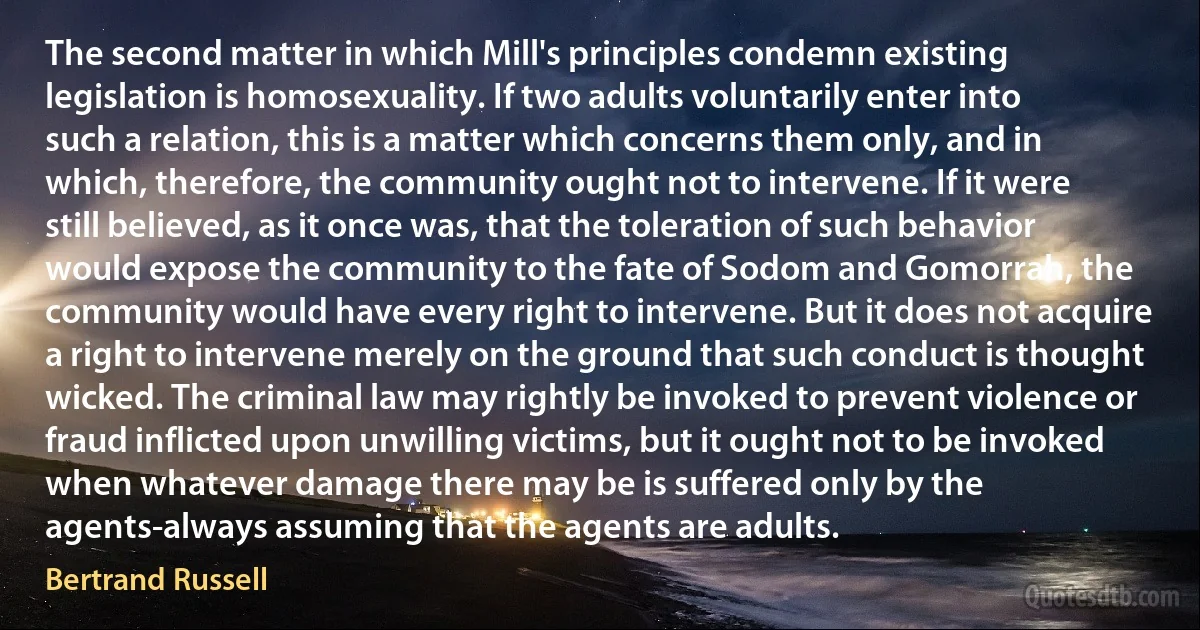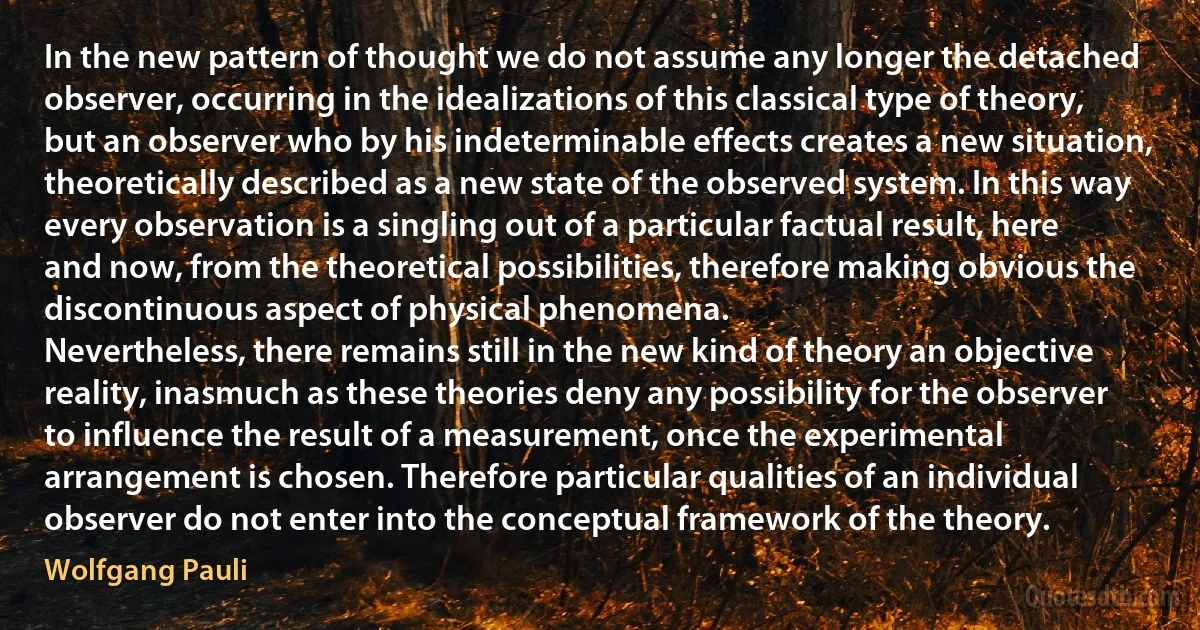Enter Quotes - page 43
Probably the greatest harm done by vast wealth is the harm that we of moderate means do ourselves when we let the vices of envy and hatred enter deep into our own natures.
But there is another harm; and it is evident that we should try to do away with that. The great corporations which we have grown to speak of rather loosely as trusts are the creatures of the State, and the State not only has the right to control them, but it is duty bound to control them wherever the need of such control is shown.

Theodore Roosevelt
Once a media group is powerful for long enough it starts to enter into a relationship with other powerful groups, that is very natural, because other powerful groups seek its favour, seek to make deals and agreements with it, and the individuals who run it. And it starts to stop seeing itself as a group that holds powerful groups to account and starts seeing itself as part of the social network of the elite.

Julian Assange
Man is encompassed with a dome of incomprehensible wonders. In him and about him is that which should fill his life with majesty and sacredness. Something of sublimity and sanctity has thus flashed down from heaven into the heart of every one that lives. There is no being so base and abandoned but hath some traits of that sacredness left upon him; something, so much perhaps in discordance with his general repute, that he hides it from all around him; some sanctuary in his soul, where no one may enter; some sacred inclosure, where the memory of a child is, or the image of a venerated parent, or the remembrance of a pure love, or the echo of some word of kindness once spoken to him; an echo that will never die away.

Albert Pike
For prayers and meditation, you can have any comfortable position. You must select a fine pose in which you can sit for a long time comfortably. The only condition is that your neck and back should be erect. Close your eyes, breathe in and out very slowly and mentally repeat the Mantra OM OM OM and think of the divine qualities of the Lord. Now you will enter into silent meditation. You will enjoy great peace and acquire inner spiritual strength. (Avoid Extremes in Yoga)

Swami Sivananda
We will study first the historical Christ; secondly, the mythic Christ; thirdly, the mystic Christ. And we shall find that elements drawn from all these make up the Jesus Christ of the Churches. They all enter into the composition of the grandiose and pathetic Figure which dominates the thoughts and the emotions of Christendom, the Man of Sorrows, the Saviour, the Lover and Lord of Men.

Annie Besant
For four hundred years the human race has not made a step but what has left its plain vestige behind. We enter now upon great centuries. The sixteenth century will be known as the age of painters, the seventeenth will be termed the age of writers, the eighteenth the age of philosophers, the nineteenth the age of apostles and prophets. To satisfy the nineteenth century, it is necessary to be the painter of the sixteenth, the writer of the seventeenth, the philosopher of the eighteenth; and it is also necessary, like Louis Blane, to have the innate and holy love of humanity which constitutes an apostolate, and opens up a prophetic vista into the future. In the twentieth century war will be dead, the scaffold will be dead, animosity will be dead, royalty will be dead, and dogmas will be dead; but Man will live. For all there will be but one country-that country the whole earth; for all there will be but one hope-that hope the whole heaven.

Victor Hugo
The thing is, I can't control that built-in bias because it's going to exist. What I can do is reflect the world through my very unique prism and perhaps people will be able to relate. I can't control how it's received, nor do I want to control how it's perceived. What I want is for people to go into the theatre and in some way their perception is shifted, so that if they do enter with their biases, perhaps they won't leave with them.

Lynn Nottage
Few minds are spacious; few even have an empty place in them or can offer some vacant point. Almost all have narrow capacities and are filled by some knowledge that blocks them up. What a torture to talk to filled heads, that allow nothing from the outside to enter them! A good mind, in order to enjoy itself and allow itself to enjoy others, always keeps itself larger than its own thoughts. And in order to do this, this thoughts must be given a pliant form, must be easily folded and unfolded, so they are capable, finally, or maintaining a natural flexibility. All those short-sighted minds see clearly within their little ideas and see nothing in those of others; they are like those bad eyes that see from close range what is obscure and cannot perceive what is clear from afar. Night minds, minds of darkness.

Joseph Joubert
Now, one of the most essential branches of English liberty is the freedom of one's house. A man's house is his castle; and whilst he is quiet, he is as well guarded as a prince in his castle. This writ, if it should be declared legal, would totally annihilate this privilege. Custom-house officers may enter our houses when they please; we are commanded to permit their entry. Their menial servants may enter, may break locks, bars, and everything in their way; and whether they break through malice or revenge, no man, no court can inquire. Bare suspicion without oath is sufficient.

James Otis
When a revolutionary situation arises in a country, before the spirit of revolt is sufficiently awakened in the masses to express itself in violent demonstrations in the streets or by rebellions and uprisings, it is through action that minorities succeed in awakening that feeling of independence and that spirit of audacity without which no revolution can come to a head.
Men of courage, not satisfied with words, but ever searching for the means to transform them into action, - men of integrity for whom the act is one with the idea, for whom prison, exile, and death are preferable to a life contrary to their principles, - intrepid souls who know that it is necessary to dare in order to succeed, - these are the lonely sentinels who enter the battle long before the masses are sufficiently roused to raise openly the banner of insurrection and to march, arms in hand, to the conquest of their rights.

Peter Kropotkin
A new reality has appeared in which you are reconciled. To enter the New Being we do not need to show anything. We must only be open to be grasped by it, although we have nothing to show.
Being reconciled - that is the first mark of the New Reality. And being reunited is its second mark. Reconciliation makes reunion possible. The New Creation is the reality in which the separated is reunited. The New Being is manifest in the Christ because in Him the separation never overcame the unity between Him and God, between Him and mankind, between Him and Himself. This gives His picture in the Gospels its overwhelming and inexhaustible power.
In Him we look at a human life that maintained the union in spite of everything that drove Him into separation. He represents and mediates the power of the New Being because He represents and mediates the power of an undisrupted union.

Paul Tillich
A few weeks after the song's release, what was a fictionalized story became very real. On October 17, Tupac was crossing the street in downtown Oakland, California, when police officers Alexander Boyovich and Kevin Rodgers stopped him. They accused him of jaywalking and asked to see his ID. In the police report, they referred to Tupac by his middle name, Amaru, and called him angry and hostile. They said Tupac told them, "This is just two white cops who want to stop a n-----.”
A month later at a press conference, Tupac told his side of the story. As he was preparing to enter Union Bank, the officers approached him. Tupac asked why they were requesting to see his ID. He accused them of having a slave-master mentality before allegedly being thrown onto the concrete, cuffed, and choked until he was left unconscious. He was put in jail for seven hours for resisting arrest and later released.

Tupac Shakur
There's a knock at the door, and Valentino and Dr. Emeterio enter. This is it. Suspense really isn't good for someone with my condition, and every second of silence is brutal. "What's up?" I ask, wanting to get this over with, one way or the other. "It's nice that something good will come out of this," Valentino says, pressing his hand to his chest. My heart skips a beat, two, ten, a hundred, a thousand, a million, and somehow, I don't die on the spot. In fact, I'm going to live. I'm going to live, live, liv, live, live, live, live, live, live, live, live, live.
But first, he has to die.

Adam Silvera
I am not writing to make people feel warm and comfortable. When my readers enter the world of my book I want them to feel like they can find a place to belong in my story. But it is not their story, and the language is familiar but it is not their language. It is a novel about belonging and it is a novel about difference, too.'

Melissa Lucashenko
Space and time are commonly regarded as the forms of existence of the real world, matter as its substance. A definite portion of matter occupies a definite part of space at a definite moment of time. It is in the composite idea of motion that these three fundamental conceptions enter into intimate relationship.

Hermann Weyl
Another great entity standing behind the Christ is the Spirit of Peace or Equilibrium. He is overshadowing the Christ, in a very similar way to the way the Christ overshadowed and worked through the disciple Jesus in Palestine. He works very closely with the law of Action and Reaction, and His function is to transform the prevalent discord, confusion, chaos, turmoil in the world into its opposite, so that we shall enter an era of tranquility and peace - in exact proportion to the present discord.

Benjamin Creme
Poetry is not; or seems not to be. But it appears that among the great conflicts of this culture, the conflict in our attitude toward poetry stands clearly lit. There are no guards built up to hide it. We call see its expression, and we can see its effects upon us. We can see our own conflict and our own resource if we look, now, at this art, which has been made of all the arts the one least acceptable.
Anyone dealing with poetry and the love of poetry must deal, then, with the hatred of poetry, and perhaps even Ignore with the indifference which is driven toward the center. It comes through as boredom, as name-calling, as the traditional attitude of the last hundred years which has chalked in the portrait of the poet as he is known to this society, which, as Herbert Read says, "does not challenge poetry in principle it merely treats it with ignorance, indifference and unconscious cruelty."
Poetry is foreign to us, we do not let it enter our daily lives.

Muriel Rukeyser



